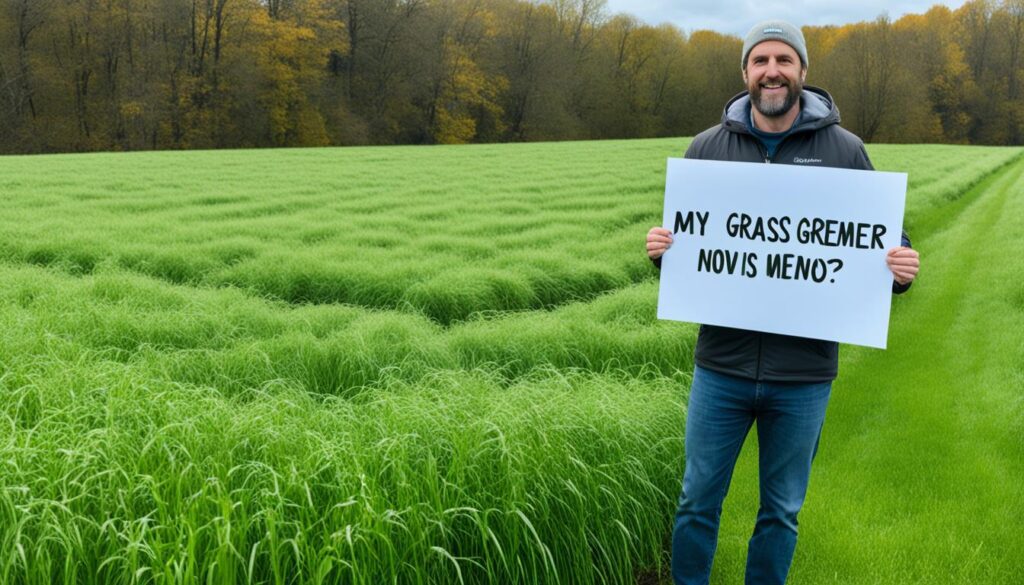“We are shaped by our thoughts; we become what we think. When the mind is pure, joy follows like a shadow that never leaves.” – Buddha
Have you ever caught yourself gazing into your neighbor’s lush green lawn, feeling a twinge of envy? Or scrolling through social media, comparing your life to the carefully curated highlight reels of others? It’s a common human tendency to believe that the grass is always greener on the other side, that someone else’s life is better, happier, and more fulfilling than our own. But what if we told you that this belief is just an illusion?
Join us on a journey of self-reflection and exploration as we delve into the origins and meaning behind the grass is greener saying. Discover how Buddhism offers valuable insights for overcoming the grass is greener syndrome and finding contentment in your own life. This article will guide you in embracing personal growth, finding peace in the present moment, and letting go of the illusion of perfection. By the end, you’ll understand that true happiness lies not in seeking what others have, but in appreciating the beauty of your own grass.
Key Takeaways:
- The grass is always greener mindset stems from our tendency to compare our lives to others and believe that someone else’s life is better.
- The saying “the grass is always greener on the other side” originated from an American folk song and dates back to ancient Greek philosophy.
- Buddhism offers valuable insights for overcoming the grass is greener syndrome through practices like mindfulness and compassion.
- Embracing personal growth and finding satisfaction in your own journey can lead to true happiness and fulfillment.
- Finding peace in the present moment and appreciating the simple joys of life can help you let go of the pursuit of perfection and find contentment within yourself.
The Origins of the Grass Is Greener Saying
The phrase “the grass is greener on the other side” has its origins in an American folk song titled “The Grass Is Always Greener in the Other Fellow’s Yard,” written in 1924. The song’s chorus reflects the meaning of the saying and questions whether the grass is truly greener on the other side of the fence. However, the concept behind the saying dates back even further to the Greek poet Ovid in the first century B.C., who expressed a similar sentiment with the phrase “The harvest is always richer in another man’s field.”
The Meaning Behind the Grass Is Greener Saying
When someone says “the grass is greener on the other side,” they are referring to the belief that the things we don’t have appear to be better than what we currently possess. This mentality, often referred to as the “grass is always greener” syndrome, leads us to constantly seek something more and feel envious of others’ lives. We may think that other jobs, relationships, or lifestyles are happier or more fulfilling, but in reality, every situation has its own challenges and drawbacks.
It’s natural for humans to imagine that the grass is greener on the other side, but this mindset can prevent us from appreciating the beauty and value in our own lives. We become fixated on what we lack and convince ourselves that it is the key to happiness. However, this mentality can be a never-ending cycle of dissatisfaction as we continuously chase after what we perceive as better.
The grass is greener syndrome can have a negative impact on our mental well-being and overall satisfaction with life. When we constantly compare ourselves to others and believe that their lives are superior, it diminishes our self-esteem and robs us of our own happiness. We may become resentful or bitter, thinking that we have been dealt an unfair hand in life.
The Dangers of the Grass Is Greener Mindset
When we are caught up in the grass is greener mindset, we may overlook the positive aspects of our own lives and fail to recognize the potential challenges and drawbacks of the lives we envy. We may believe that a different job would bring us more fulfillment, but we might not consider the long hours, stress, or lack of work-life balance that could accompany it. Similarly, we may long for a different relationship, but we might not consider the sacrifices or conflicts that could arise.
The grass always appears greener on the other side because we are only seeing a limited perspective. We don’t have access to the full picture of someone else’s life, including their struggles, disappointments, or sacrifices. It’s easy to glamorize what we don’t have and idealize the lives of others, but the reality is often different.
Furthermore, constantly chasing after what we perceive as better can prevent us from fully experiencing and enjoying the present moment. We may become so focused on what we don’t have that we fail to appreciate the blessings and opportunities that are right in front of us. This constant longing for something else can lead to a sense of perpetual dissatisfaction and prevent us from finding true contentment.
Shifting Your Perspective
To overcome the grass is greener syndrome, it is important to shift your perspective and practice gratitude. Instead of constantly comparing yourself to others, take a moment to reflect on the things you are grateful for in your own life. Cultivate an attitude of appreciation and focus on the positive aspects of your current situation.
Remember that no life is perfect, and every situation has its own challenges. Instead of idealizing the lives of others, try to cultivate empathy and understanding. Recognize that everyone faces their own struggles and that what may appear as greener grass from afar may have its own set of difficulties up close.
Find contentment in the present moment and embrace the opportunities for growth and self-improvement that exist within your own life. Instead of constantly seeking what you perceive as better, focus on personal development and becoming the best version of yourself. Invest time and energy into your own passions, relationships, and goals.
By shifting your perspective and practicing gratitude, you can find true contentment and appreciate the beauty of your own grass. The grass may indeed be greener on the other side, but it is only by nurturing and tending to your own grass that you can truly experience its vibrant and fulfilling potential.

Overcoming the Grass Is Greener Syndrome
When it comes to overcoming the grass is greener syndrome, Buddhism offers valuable insights that can help us find contentment in our own lives. By incorporating mindfulness, compassion, and addressing modern challenges, we can navigate the temptation of constantly searching for greener pastures.
Mindfulness plays a crucial role in our quest for contentment. By being fully present in the current moment, we can cultivate a deep sense of appreciation for what we already have. Mindfulness allows us to shift our focus from what we lack to what we possess, fostering a sense of gratitude and contentment. It reminds us that true happiness lies in embracing and making the most of our current circumstances.
Compassion is another essential principle in overcoming the grass is greener mindset. By developing compassion for others, we begin to recognize that everyone faces their own struggles and challenges. This understanding helps us let go of envy and comparison, enabling us to appreciate the unique beauty of our own lives. Through compassion, we can cultivate a genuine desire for the well-being of others and shift our perspective from what others have to how we can contribute to their happiness.

Cultivating Contentment
In our fast-paced and constantly changing world, it’s easy to get caught up in the desire for more. However, contentment is not found in the pursuit of external achievements or possessions. It is a state of mind that stems from appreciating and finding fulfillment in the present moment.
Practicing mindfulness and compassion are powerful tools for cultivating contentment. They allow us to shift our focus from external comparisons to internal growth and acceptance. By redirecting our energy towards personal development and embracing who we are, we can find deep satisfaction and joy in our own lives.
Techniques for Overcoming the Grass Is Greener Syndrome
| Technique | Description |
|---|---|
| Mindfulness | Being fully present in the moment and appreciating what we have |
| Compassion | Cultivating empathy for others and recognizing their struggles |
| Self-reflection | Examining our own desires and questioning their validity |
| Gratitude practices | Nurturing a sense of appreciation for the blessings in our lives |
| Setting realistic goals | Aligning our aspirations with our values and true desires |
By incorporating these techniques into our daily lives, we can overcome the grass is greener syndrome and discover a profound sense of contentment within ourselves. Instead of constantly seeking what others have, let’s focus our energy on nurturing mindfulness, compassion, and gratitude. In doing so, we can find fulfillment and joy in our own unique journey.
Embracing Personal Growth and Satisfaction
Instead of constantly seeking what others have, it is important to focus on personal growth and self-improvement. Rather than comparing ourselves to others, we should strive to become the best version of ourselves. This path of self-acceptance and growth allows us to find satisfaction and fulfillment in our own lives, without constantly longing for what we don’t have. It is through personal development and embracing who we are that we can truly find happiness.
When we prioritize personal growth, we commit to continuously improving ourselves. This involves setting goals, acquiring new skills, and challenging our perceived limitations. By focusing on our own journey, we shift our attention away from comparison and external validation, and channel it towards self-discovery and self-mastery.
Personal growth is not a linear process, but rather a series of individual experiences and breakthroughs that shape us. It requires self-reflection, self-awareness, and the willingness to step out of our comfort zones. By embracing personal growth, we open ourselves up to new possibilities and opportunities for self-fulfillment that we may have never imagined.
One way to embark on the path of personal growth is by cultivating a growth mindset. This involves viewing challenges as opportunities for learning and growth, rather than obstacles to be avoided. With a growth mindset, we become resilient in the face of adversity and embrace the journey of self-improvement with enthusiasm and curiosity.
The Benefits of Personal Growth:
- Increased self-confidence and self-esteem
- Greater resilience and adaptability
- Improved problem-solving and decision-making skills
- Enhanced creativity and innovation
- Expanded knowledge and perspective
- Stronger relationships and communication skills
- Opportunities for career advancement and success
Personal growth is a lifelong journey that requires dedication, perseverance, and an open mind. As we commit to embracing personal growth, we become active participants in our own lives, taking ownership of our happiness and fulfillment.
| Personal Growth Strategies | Benefits |
|---|---|
| Continuous learning and skill development | Acquiring new knowledge and abilities |
| Self-reflection and introspection | Gaining self-awareness and understanding |
| Goal setting and action planning | Creating a sense of purpose and direction |
| Seeking feedback and guidance | Improving performance and developing relationships |
| Embracing challenges and taking risks | Building resilience and expanding comfort zones |
| Practicing mindfulness and self-care | Promoting well-being and reducing stress |
By embracing personal growth, we unlock our full potential and discover the depths of our capabilities. We find satisfaction and fulfillment in our own growth and progress, rather than relying on external factors for validation. Through self-improvement and self-acceptance, we pave the way for a truly fulfilling and meaningful life.
Finding Peace in the Present Moment
One of the keys to overcoming the grass is greener mindset is finding peace in the present moment. Instead of constantly longing for something else or dwelling on what we don’t have, you can choose to be grateful and appreciate the present. By practicing gratitude and focusing on the blessings in your life, you can cultivate a sense of contentment and joy.
Living in the present moment allows you to fully experience life and find peace within yourself. When you are fully present, you are able to let go of regrets about the past and worries about the future. This allows you to connect with the beauty and goodness of the present moment.
The Power of Mindfulness
Mindfulness is a practice that can help you live in the present moment. It involves paying attention to your thoughts, feelings, and sensations without judgment. By practicing mindfulness, you can become more aware of the present moment and let go of distractions and negative thoughts.
Take a few moments each day to pause and pay attention to your breath. Notice the sensations of the breath as it enters and leaves your body. When your mind starts to wander, gently bring your awareness back to your breath. This simple practice can help bring you into the present moment and cultivate a sense of peace and calm.
Another way to practice mindfulness is to engage in activities with full awareness. Whether it’s eating a meal, walking in nature, or spending time with loved ones, immerse yourself fully in the experience. Notice the sights, sounds, smells, and sensations associated with the activity. By bringing your full attention to the present moment, you can find a deep sense of peace and fulfillment.
The Role of Gratitude
Gratitude is another powerful tool for finding peace in the present moment. When you shift your focus to what you’re grateful for, you naturally cultivate a sense of contentment and appreciation. Take a few moments each day to reflect on the things you’re grateful for. It could be the people in your life, the experiences you’ve had, or the simple pleasures that bring you joy.
Write down your gratitude list or simply think about it in your mind. This practice can help you shift your mindset and bring more positivity into your life. It’s a reminder that there are many beautiful things to be thankful for right now, in this present moment.
Practicing gratitude doesn’t mean ignoring the challenges or difficulties in your life. It simply helps you shift your focus towards the things that bring you joy and fulfillment. By cultivating a grateful attitude, you can find peace and satisfaction in the present moment.

By living in the present moment, practicing mindfulness, and cultivating gratitude, you can find the peace and contentment you seek. Appreciate the beauty of the present, embrace the blessings in your life, and let go of the constant longing for something more. The grass may not be greener on the other side, but by finding peace within yourself, you can create a life that is truly fulfilling.
The Illusion of Perfection and the Simple Life
One of the main factors contributing to the grass is greener syndrome is the illusion of perfection. It’s easy to fall into the trap of thinking that other people’s lives are flawless and better than our own. We scroll through social media and see carefully curated images of seemingly perfect lives, which can leave us feeling dissatisfied with our own reality.
However, it’s important to remember that no life is perfect. Behind those carefully crafted Instagram posts and Facebook updates, everyone faces their own challenges and difficulties. What may appear as perfection from the outside often conceals the realities and struggles that lie beneath the surface.
To break free from this illusion of perfection, we need to embrace the simplicity of life. Instead of constantly striving for an unattainable ideal, we can find happiness in the ordinary moments of our everyday lives. It’s about appreciating the small joys, the laughter shared with loved ones, and the beauty of simplicity.
Living a simple life doesn’t mean settling for less. It means prioritizing what truly matters and letting go of the constant need for more. By simplifying our lives, we can focus on the things that bring us genuine happiness, such as meaningful relationships, personal growth, and experiences that align with our values.
By embracing the simple life, we can find contentment and fulfillment. We no longer measure our worth by comparing ourselves to others or striving for an unattainable image of perfection. Instead, we find joy in the present moment and appreciate the imperfect beauty that surrounds us.

Embracing Imperfections
Embracing the simple life allows us to embrace our own imperfections and accept ourselves as we are. We let go of the need to constantly chase after the next big thing and find contentment in the here and now.
When we focus on living a simple life, we discover that happiness isn’t found in the accumulation of material possessions or the pursuit of perfection. It’s found in the moments of connection, the freedom to be ourselves, and the appreciation for the present moment.
So let go of the illusion of perfection and embrace the simple life. Find joy in the ordinary, cultivate gratitude, and discover true happiness in the beauty of simplicity.
The Simple Life vs. the Illusion of Perfection: A Comparison
| The Simple Life | The Illusion of Perfection |
|---|---|
| Focus on what truly matters | Constant pursuit of unattainable ideals |
| Appreciation for small joys | Dissatisfaction with the present moment |
| Contentment and fulfillment | Never-ending cycle of comparison |
| Embracing imperfection | Striving for an idealized image |
Conclusion
In conclusion, the grass is not always greener on the other side. It is a common misconception that others have a better life than us, leading us to constantly seek what we don’t have and feel envious of others. However, the reality is that every situation comes with its own set of challenges and drawbacks.
Instead of fixating on what others have, it is essential to focus on our own lives and embrace the present moment. By practicing mindfulness, we can cultivate a deep sense of awareness and appreciation for what we already possess. Mindfulness allows us to fully experience the present, finding contentment and joy in the here and now.
Furthermore, personal growth is key to finding true happiness and fulfillment. Rather than comparing ourselves to others, we should strive to become the best versions of ourselves. Embracing our unique journey and accepting who we are can bring a profound sense of satisfaction and self-empowerment. By letting go of the pursuit of perfection, we open ourselves up to the simple joys of life.
In essence, cultivating gratitude and contentment is the key to embracing the present moment and finding true happiness. By appreciating what we have, rather than constantly longing for what we don’t, we can experience a deep sense of fulfillment in our own lives. Remember, the grass is not always greener on the other side; it’s about finding beauty and contentment in our own grass.
FAQ
What does the saying "the grass is always greener on the other side" mean?
The saying reflects our tendency to believe that other people’s lives are better than our own and that what others have appears to be more desirable.
What is the origin of the grass is greener saying?
The saying has its origins in an American folk song titled “The Grass Is Always Greener in the Other Fellow’s Yard” written in 1924.
What is the grass is always greener syndrome?
The grass is always greener syndrome refers to the mindset of constantly seeking something better and feeling envious of others’ lives, thinking that they are happier or more fulfilling.
How can you overcome the grass is greener syndrome?
Overcoming the syndrome involves practicing mindfulness, cultivating compassion, and finding contentment in our own lives.
How can personal growth and self-improvement help overcome the grass is greener mindset?
Focusing on personal growth and becoming the best version of ourselves can lead to satisfaction and fulfillment in our own lives, without constantly longing for what we don’t have.
How can you find peace in the present moment?
Finding peace in the present moment involves practicing gratitude, appreciating the blessings in our lives, and fully experiencing life as it is.
What is the illusion of perfection and how does it relate to the grass is greener mindset?
The illusion of perfection refers to the belief that other people’s lives are flawless and better than our own. Embracing the simplicity of life and finding happiness in the ordinary can lead to a more fulfilling and content existence.

